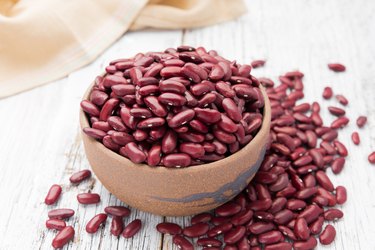
Red kidney beans can be toxic. Although safe to eat when properly cooked, they should not be eaten raw or partially cooked, because of the naturally occurring toxin Phytohaemagglutinin. This versatile bean lends itself well to both main and side dishes and offers you a wide range of nutrients.
Tip
Red kidney beans contain a toxin which can cause gastrointestinal upset. However, they are safe to eat once they are cooked.
Video of the Day
Read more: Red Kidney Beans Health Risk
Video of the Day
Are Kidney Beans Toxic?
Kidney beans are classified as a subgroup of the Vegetable Group, according to the U.S. Department of Agriculture. Kidney beans and other types of beans contain a lectin, or carbohydrate-binding protein, called Phytohaemagglutinin. However, the red kidney bean holds the distinction for the bean with the highest concentration of this dangerous toxin.
The toxin, measured in hemagglutinating units, or hau — a measure of toxicity — falls from a high of 70,000 hau in raw beans to under 400 hau when you thoroughly cook the red kidney beans, according to The Ohio State University College of Food, Agricultural, and Environmental Sciences. Unfortunately, you do not have to eat very many beans to get sick, as it only takes eating four or five raw or undercooked beans before symptoms begin.
Even slightly under cooked red kidney beans are toxic, as evidenced by information in a foundational analysis of 50 incidents of red kidney bean poisoning in the UK. The study, published in July 1990 by Epidemiology and Infection found that eating both raw beans and those inadequately cooked on the stove or in a slow cooker could cause illness.
The study found that if you soak the beans overnight to soften them, and then boil them for a minimum of 10 minutes, the toxin drops to an acceptable and safe level. Avoid cooking the beans at a low temperature, as a bean cooked at 180 degrees Fahrenheit can still be toxic.
A 2009 article published by Pakistan Journal of Nutrition, also reports that consumption of raw or under-cooked kidney beans has been shown to cause food poisoning.
Avoid Kidney Bean Food Poisoning
The symptoms of consuming kidney bean lectin include extreme gastrointestinal upset with nausea and vomiting often beginning within a few hours of consumption. Other symptoms include diarrhea and stomach pain, according to Harvard School of Public Health.
If you develop these symptoms after eating an undercooked or raw kidney bean, call your doctor and ask for his treatment recommendations.
As long as you cook the red kidney beans thoroughly and boil them for 10 minutes, you do not need to avoid consuming this healthy bean. Avoid using a crockpot, and cook the beans on the stove instead to ensure the beans do not simmer at a relatively low temperature and thus fail to come to a complete boil.
Keep raw beans away from young children, who may not understand that eating a raw bean may be dangerous. Use kidney beans in salads, with basmati rice, in chili or served as a side dish.
- USDA: Phaseolus Vulgaris L.: Kidney Bean
- Epidemiology and Infection: "Red Kidney Bean Poisoning in the UK: An Analysis of 50 Suspected Incidents Between 1979 and 1989"
- The Ohio State University College of Food, Agricultural, and Environmental Sciences: "Dry Kidney Beans Need to be Boiled"
- Harvard School of Public Health: "Lectins"
- Pakistan Journal of Nutrition: "Dietary Lectins as disease Causing Toxicants"
- USDA: "Beans and Peas Are Unique Foods"